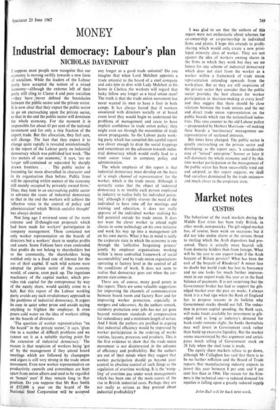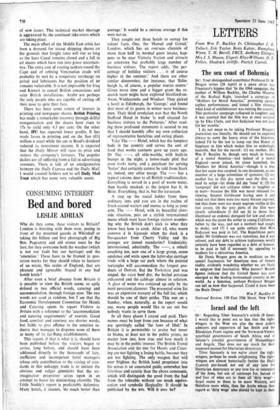Market notes
CUSTOS
The behaviour of the stock markets during the Middle East crisis has been truly British, in other words, non-panicky. The gilt-edged market has, of course, been weak on occasions but it did not take undue alarm at the serious threat to sterling which the Arab depositors had pre- sented. There is actually more bearish talk from domestic holders than from foreign. What will be the cost to our export trade if the Arab boycott of Britain persists? What has been the cost of the boycott of Rhodesia? A minor loss no doubt but world trade has lost its buoyancy and no one looks for much 'further improve- ment in our export trade this year or in the final balance of payments. It is not surprising that the Government broker has had to support the gilt- edged market over the past six weeks. I always think it is a bad sign when the Bank of England has to propose reasons in its bulletin why Government stocks should not fall. The reduc- tion in private capital spending, the Bank says, will make funds available for investment in gilt- edged and as long as industry's demand for bank credit remains slight, the banks themselves may well invest in Government stock rather than build up excessive liquidity. But the market seems unconvinced by this argument and antici- pates much selling of Government stock on 28 July when the steel issue is made.
The equity share markets refuse to go down, although Mr Callaghan has said that there is to be no further reflation and the Board of Trade reports that manufacturing industry expects to invest this year between 8 per cent and 9 per cent less than in l966. The reason for the firm- ness is the technical one—a reduced demand for equities is falling upon a greatly reduced supply
John Bull will be back next week.
of new issues. This technical market shortage is aggravated by the continual take-overs which are taking place.
The main effect of the Middle East crisis has been a demand for tramp shipping shares on the grounds that freight rates will rise as long as the Suez Canal remains closed and a fall in oil shares which have run into grave uncertain- ties. The extra cost of routing tankers round the Cape and of refining Venezuelan crude will probably be met by a temporary surcharge on petrol and lubricants but the position of BP remains vulnerable. It is not impossible for Iraq and Kuwait to cancel British concessions and seize British installations. Arabs are perhaps the only people who are capable of cutting off their nose to spite their face.
There has been some return of interest in printing and newspaper shares. British Printing has made a remarkable recovery through skilful reorganisation and the shares have risen to 173 to yield only 4.3 per cent. On the other hand, IPC has reported lower profits. It has made losses in printing and on the Sun (£1f million a year) while the cut in Reed's dividend reduced its investment income. It is expected that the Daily Mirror will raise its price and restore the company's fortunes. The popular dailies are all suffering from a fall in advertising revenues. There is talk of an amalgamation between the Daily Express and the Daily Mail.
would counsel holders not to sell Daily Mail Trust which has some very valuable assets.































 Previous page
Previous page